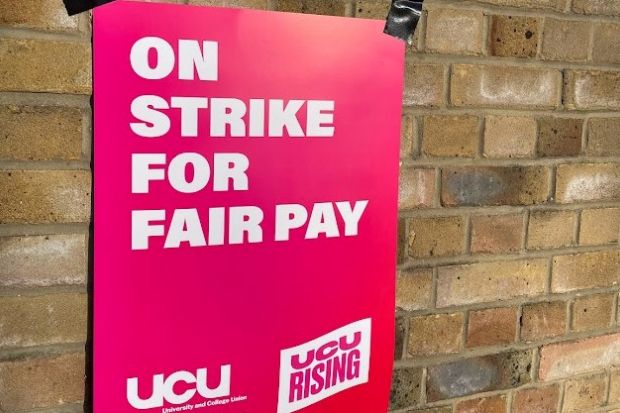Staff at Sheffield Hallam University and the University of Winchester are set to strike over job cuts, it has been announced.
The University and College Union (UCU) has also launched a global academic boycott of Goldsmiths, University of London over the institution’s own redundancy plans.
The fresh wave of industrial action comes amid dire warnings for the financial health of the sector. At Hallam, a UCU strike ballot resulted in 87 per cent of members supporting industrial action, on a turnout of 53 per cent. The union was objecting to what it said were “drastic” job losses, and the erosion of terms and conditions.
Hallam has already undertaken two job-cutting exercises already this year, with risk of redundancy letters issued to more than 100 staff members, and voluntary severance offered to all 1,700 academic staff at the end of last year.
The union said a further 400 professional services jobs will now be axed, with some staff facing compulsory redundancy.
UCU general secretary Jo Grady said staff have voted for action because they “cannot stand by and let management force though these outrageous cuts which would see teaching, research and academic standards torn to shreds”.
“It is disgraceful to see that rather than reviewing its spending on new buildings and a satellite campus halfway across the country, management would rather slash jobs, jeopardise academic standards, and tear up our hard-won terms and conditions.”
Hallam said it was making tough decisions amid external pressures and was disappointed that the union had voted to strike.
“Our priority during any industrial action will be to do everything possible to minimise the impact on our students and wider community,” a spokesperson added.
“Throughout this period, we will do everything possible to avoid any compulsory redundancies and are engaging with trade union representatives as part of collective consultation.”
While the strike dates are yet to be announced at Hallam, staff at Winchester are going on strike on 4 June. UCU members are taking action to prevent 40 jobs being lost at the institution, as well as over “excessive workloads”.
The cuts include the threatened closure of the Institute for Climate and Social Justice as well as the Centre of Religion, Reconciliation and Peace. The university said it needed to make the cuts because of a £6 million structural deficit.
A spokesperson said the institution was acting responsibly in the context of “very serious financial challenges” across the sector.
“The proposals upon which we have consulted reflect the challenging financial circumstances facing the university sector as a whole and are not a reflection of the dedication and performance of those affected,” they added.
But Dr Grady accused Winchester’s management of refusing to listen to its staff and said it was pushing ahead with compulsory redundancies that will have a “devastating impact on staff and students”.
“Our members have now faced constant redundancy cycles for half a decade, leaving morale at an all-time low.
“We are prepared to take further strike action next semester unless management begins meaningful negotiations over its threatened cuts and punitive new workload model.”
At Goldsmiths, staff are already carrying out a marking boycott in a dispute over the university’s cost-cutting measures. UCU has now announced an academic boycott at the university, beginning on 3 June.
It means the union has told its members and supporters worldwide not to apply for any advertised jobs at Goldsmiths, speak at or organise academic or other conferences at the institution, give lectures there or accept visiting professor positions.
It marks the second time that warden Frances Corner has faced an academic boycott at her institution, after a similar move in 2022.
Dr Grady said the redundancies would cause “irreparable damage” to the institution, adding: “It is staggering that Frances Corner is still refusing to back down from these job cuts even with our members undertaking a marking boycott and an overwhelming mandate for wider industrial action.”
A Goldsmiths spokesperson said it had consulted with staff for 65 days, which had resulted in “significant changes in relation to our processes and decision-making”, but it was now “regrettably moving to the next stage of the redundancy process”.
“The actions we are taking are in response to the unprecedented challenges that Goldsmiths and other universities are facing from a funding system that is no longer fit for purpose and are part of a wider plan aimed at ensuring that Goldsmiths continues to be a beacon for radical research and innovative teaching as well as an entry point for students, many of whom are the first in their family to go to university”, they added.




